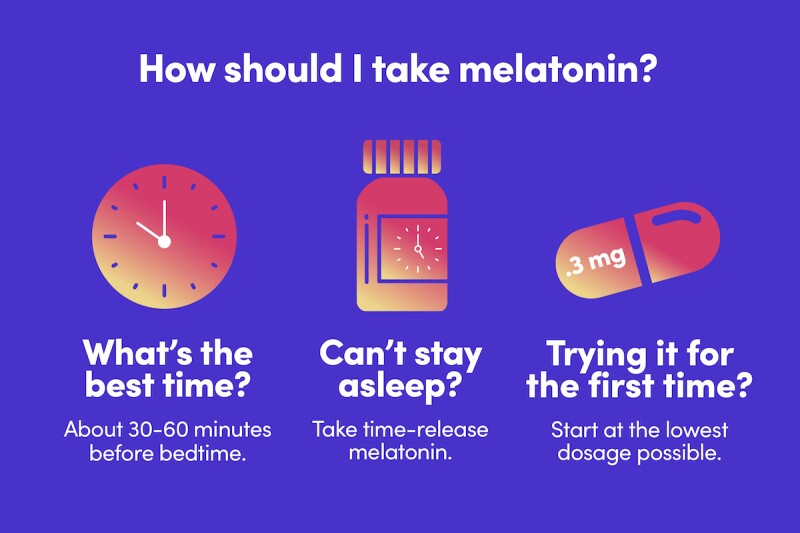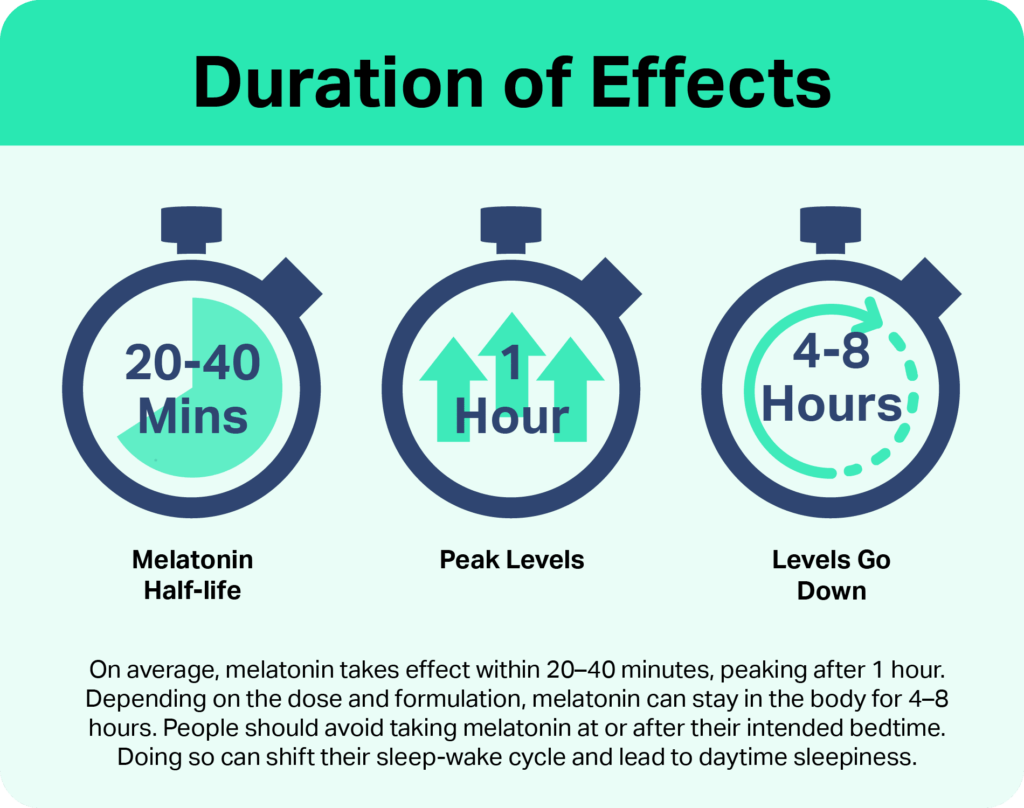Antwort Who should avoid melatonin? Weitere Antworten – What happens if you take melatonin and don’t sleep
“If melatonin for sleep isn't helping after a week or two, stop using it,” says Buenaver. “And if your sleep problems continue, talk with your health care provider. If melatonin does seem to help, it's safe for most people to take nightly for one to two months.The usual dose is one 2mg slow release tablet taken 1 to 2 hours before bedtime.If you take melatonin at 3 a.m. you may wake up with high melatonin levels, which can push back your circadian rhythm the next night. Instead of popping a melatonin, we've covered what to do if you're awake at 3 a.m. here. And the RISE app has many tools, guides, and soothing sounds to help you fall back asleep.
How long does melatonin make you sleep : On average, melatonin takes effect within 30–60 minutes. OTC melatonin can stay in the body for 4–10 hours, depending on the dose and formulation. People should avoid taking melatonin at or after their intended bedtime. Doing so can shift their sleep-wake cycle and lead to daytime sleepiness.
Is it OK to take melatonin every night
Melatonin is safe for short-term use and can be helpful for sleep issues. Long-term use of melatonin may lead to decreased effectiveness and impact your natural melatonin production. Watch for side effects of excessive melatonin use, including headaches, nausea, and fatigue.
Why would someone not take melatonin : Melatonin supplements can also interact with common drugs such as some seizure medications, beta-blockers, calcium channel blockers and Coumadin, a common blood thinner. In addition, pregnant people and those who are lactating should not take melatonin. Even for those who may benefit from melatonin, Dr.
Below is a partial list of medications that may interact with melatonin.
- Antidepressant medications.
- Antipsychotic medications.
- Benzodiazepines.
- Birth control pills.
- Blood pressure medications.
- Beta-blockers.
- Blood-thinning medications (anticoagulants).
- Interleukin-2.
Less common melatonin side effects might include short-lasting feelings of depression, mild tremor, mild anxiety, abdominal cramps, irritability, reduced alertness, confusion or disorientation. Because melatonin can cause daytime drowsiness, don't drive or use machinery within five hours of taking the supplement.
Is melatonin safe for sleeping
Generally safe
Your body likely produces enough melatonin for its general needs. However, evidence suggests that melatonin supplements promote sleep and are safe for short-term use. Melatonin can be used to treat delayed sleep phase and circadian rhythm sleep disorders in the blind and provide some insomnia relief.Melatonin is a hormone that regulates your sleep-wake cycle. It's often taken as a supplement to help with sleep issues like insomnia and jet lag. However, little is known about melatonin's long-term safety and efficacy. Common side effects include dizziness, headache, nausea, and sleepiness.Melatonin has been linked to headaches, dizziness, nausea, stomach cramps, drowsiness, confusion or disorientation, irritability and mild anxiety, depression and tremors as well as abnormally low blood pressure. It can also interact with common medications and trigger allergies.
Generally safe
Your body likely produces enough melatonin for its general needs. However, evidence suggests that melatonin supplements promote sleep and are safe for short-term use. Melatonin can be used to treat delayed sleep phase and circadian rhythm sleep disorders in the blind and provide some insomnia relief.
Is melatonin bad for your liver or kidneys : In several clinical trials, melatonin was found to be well tolerated and not associated with serum enzyme elevations or evidence of liver injury.
Is it OK if I take melatonin every night : Melatonin is safe for short-term use and can be helpful for sleep issues. Long-term use of melatonin may lead to decreased effectiveness and impact your natural melatonin production. Watch for side effects of excessive melatonin use, including headaches, nausea, and fatigue.
Why not to take melatonin
Melatonin might inhibit the effects of anticonvulsants and increase the frequency of seizures particularly in children with neurological disabilities. Blood pressure drugs. Melatonin might worsen blood pressure in people taking blood pressure medications. Central nervous system (CNS) depressants.
Less common melatonin side effects might include short-lasting feelings of depression, mild tremor, mild anxiety, abdominal cramps, irritability, reduced alertness, confusion or disorientation. Because melatonin can cause daytime drowsiness, don't drive or use machinery within five hours of taking the supplement.The most common melatonin side effects include: Headache. Dizziness. Nausea.
Why is melatonin illegal in Europe : In the UK and most of Europe, it's classed as a medicine, not a health supplement and as such, requires a prescription. This is because melatonin is considered “medical by function” which means that it requires a drug licence.





